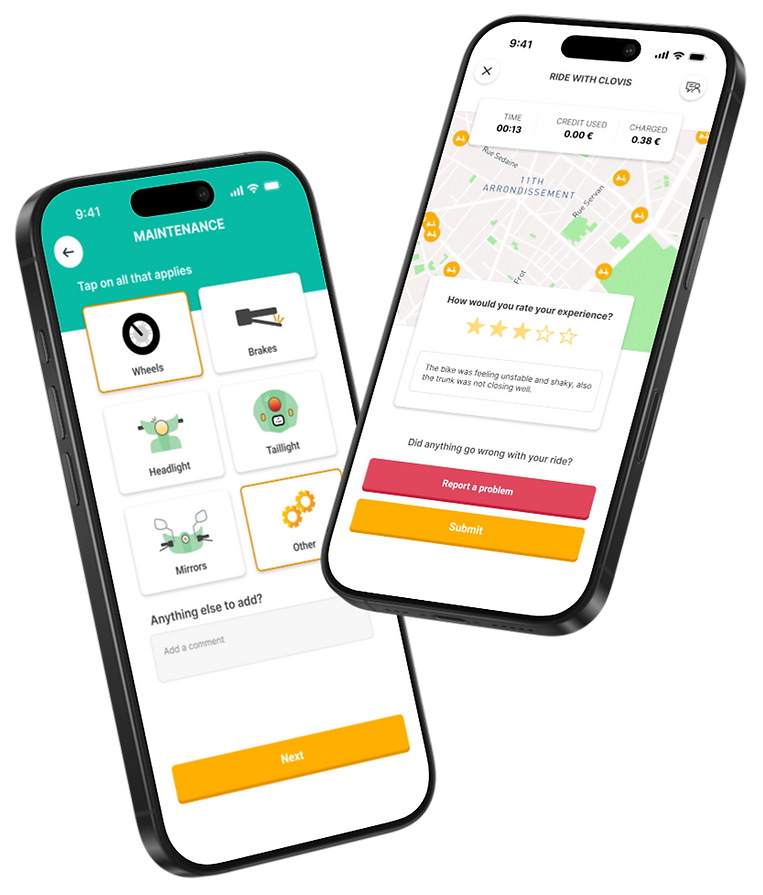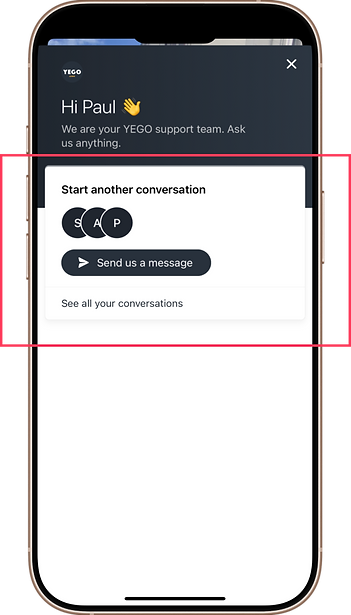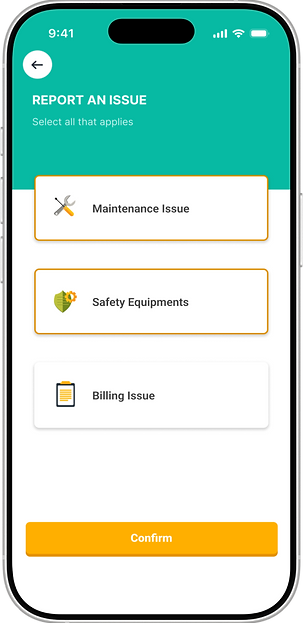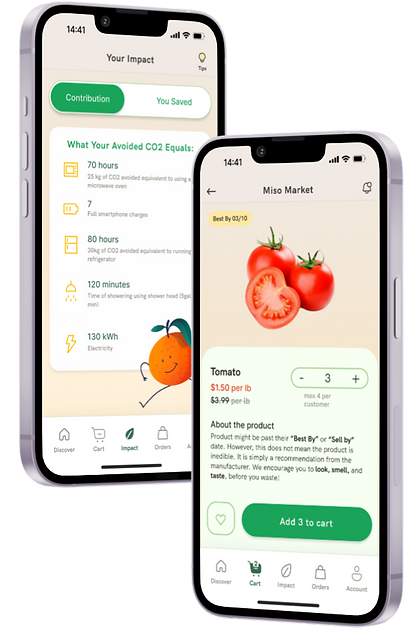Increasing Retention and Improving User Satisfaction


About
YEGO is an electric scooter-sharing platform designed for urban commuters.
Operating in Barcelona and nearby municipalities, YEGO combines practicality, performance, and sustainability to provide eco-friendly transportation.


Role
UX Designer

Team
Founder, two engineers, 2 Designers

Timeline
8 weeks

Skills
Usability testing Wirer-framing, Prototyping, Collaboration
Understanding the problem
Lack of a Feedback loop
YEGO users struggled with incomplete rides and poor experiences due to missing safety equipment, scooter malfunctions, and the lack of a feedback loop system.
• 65% didn’t report issues
• 40% were frustrated by the lack of a clear feedback channel
Without a structured system, critical issues went unreported—slowing service improvements and lowering user satisfaction.
Solution and Outcome
Star Rating System + Category Submission
I partnered with the PM and developers to design and implement a structured post-ride review system within the app. This allowed users to easily report issues related to safety, performance, and billing immediately after their ride. The design focused on minimizing friction and encouraging consistent feedback.
Impact:
• 85% found reporting more efficient
• 70% felt their concerns were addressed
• 80% were more likely to give feedback
Hearing from YEGO Users
Pain points & Frustrations
65% of users experienced issues with scooter maintenance, safety equipment, or app malfunctions but didn’t report them.
40% were frustrated by the lack of a clear feedback system, making it difficult to voice concerns and trust that issues would be resolved.



What are users' main challenges when using YEGO, from riding a bike to completing their trip?



What's Not Working?
Walking in User's shoes...
Lack of Feedback Option
Concerned for her safety, Chloe hesitates.
“I can’t ride without a helmet—it’s unsafe!” Frustrated, she decides to leave the bike behind. To make matters worse, there’s no way to leave feedback about her experience, leaving her feeling ignored and dissatisfied.
Missing Helmet
Here is Chloe, she notices there’s no helmet available and immediately feels concerned. Without a quick solution to resolve the issue, she’s left frustrated, unsure how to proceed with her ride safely.




Unstable Bike
Here is Paul: he hops on a bike only to feel it wobble beneath him. The bike is unstable, and the foggy control panel makes it hard to read key info like battery levels and speed. Concerned for his safety, he decides to cut his ride short.


Frustrated, Paul faces two choices:
Wait on the phone with customer support or let his concern go unheard. With no quick way to leave feedback, he feels stuck, his frustration growing as the lack of a simple solution leaves him completely dissatisfied.


Problem Statement:
1
Ineffective Feedback System
The absence of a streamlined feedback mechanism discourages users from reporting ride issues, limiting opportunities for service improvement.
2
Missing Safety Equipments
Users frequently encounter unreliable equipment, such as helmets and phone holders, compromising safety and ride quality.
3
Operational Challenges
The lack of user feedback leads to unresolved malfunctions, resulting in reduced bike availability and decreased service reliability within the community.
Testing the Product
Understanding the Current Flow
03. Chat Support and Limited options
Users are forced to contact customer support via chat to voice their frustration, creating an unnecessary barrier to providing feedback.
This process discourages users from sharing their concerns, limiting the business’s ability to address issues promptly and improve the service.
02. Mandating Confirmation Despite Missing Items
Requiring users to confirm all equipment is present before finishing the ride leads to inaccurate attestations, as missing items are overlooked.
This not only confuses users but also results in unreported issues, preventing the business from addressing equipment shortages and negatively impacting service quality.
01. Restricted Options
Users are frustrated with the limited options during a ride—'Pause Ride' and 'Finish Ride.'
The lack of a 'Leave Feedback' option prevents them from reporting issues, leaving concerns unaddressed and dissatisfaction growing.



Bridging the Gap
Aligning User and Business Goals
Business Goals
User Goals
Safety,
Reliability,
Accessibility,
maintenance,
Enhance service quality and responsive maintenance through issue tracking and resolution
Promote user satisfaction with the service by increasing NPS scores.
Ability to share feedback after trying the service
Ability to alert the system in case of malfunction
Ensure a safe ride with access to helmets and phone holder

Four Quick Steps
To Improve YEGO's Service Quality




Rate Your Ride
A mandatory post-ride rating system collects targeted feedback on scooter condition, app usability, and support quality, This provides a quick snapshot of satisfaction and allows YEGO to gauge overall service quality.
Report Safety or Maintenance Issues
If the user encounters a safety or maintenance issue, they can flag it immediately. This step ensures that critical issues are addressed swiftly and effectively.
Specify the Issue Category
Choosing a relevant category (e.g., bike condition, safety, missing equipment) to help direct the feedback to the right team. The more specific the issue, the quicker it can be resolved.
Earn Rewards for Feedback
To encourage active participation, users will be rewarded for submitting feedback. Earn incentives, such as ride discounts or credits, to help improve the overall YEGO experience.
Solution:
Incorporating a Mandatory Feedback System
Rating and Review System
Provides user insights and promotes service improvement
By allowing users to quickly leave star ratings and feedback after their ride, the system gives them a voice to share concerns and feel heard. This not only improves the overall user experience but also helps YEGO identify and resolve issues faster—enhancing service quality and contributing to increased customer retention and revenue.




In-App Feedback System
Efficient Issue Reporting and Incentives
The ‘Report an issue’ button gives users further opportunity to specify problems, helping YEGO improve service quality and prevent future issues.
Incentives for detailed feedback encourage active participation, strengthen the feedback loop, and enhance the overall user experience.
Usability testing showed a strong satisfaction score of 6.7/7, confirming the effectiveness of the star rating system.
-
85% of users said issue categorization made reporting easier
-
70% felt more confident their concerns were being addressed
-
80% were more likely to report issues, feeling heard and supported
Improving YEGO User Experince
Testing the Feature
02. Reporting an Issue
85% of users reported that selecting an issue category streamlined the reporting process, reducing confusion and improving efficiency.
01. Star Rating System
100% of users reported that the star rating system made it easier to share their ride experience, reducing the time spent on feedback by 40%.



03. Categorization
70% of users felt more confident their concerns were addressed, thanks to the clear categorization system. Additionally, 50% reported being more inclined to share issues, feeling acknowledged and understood, which strengthened trust and engagement.

04. Incentive
80% of users reported being more motivated to leave detailed feedback when offered an incentive, with 65% noting it made them feel valued and appreciated, fostering a stronger connection to the service.





Reflection
Achievements
Improved user engagement and trust by optimizing the feedback process:
-
• 85% found reporting more efficient
• 70% felt their concerns were addressed
• 80% were more likely to give feedback
Next Project


A platform designed to minimize food waste.
Designed an end to end experience that encourages eco-friendly choices with personalized shopping flows, impact summaries, and curated recipe bags for convenient, sustainable shopping.
The Solution aims to:
-
Avoid 2.7 kg of CO2e emissions with every bag saved.
-
Clients could save an estimated $150–$200 per month.
-
The business could see a 25% increase in retention.

